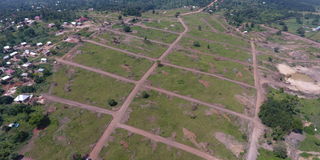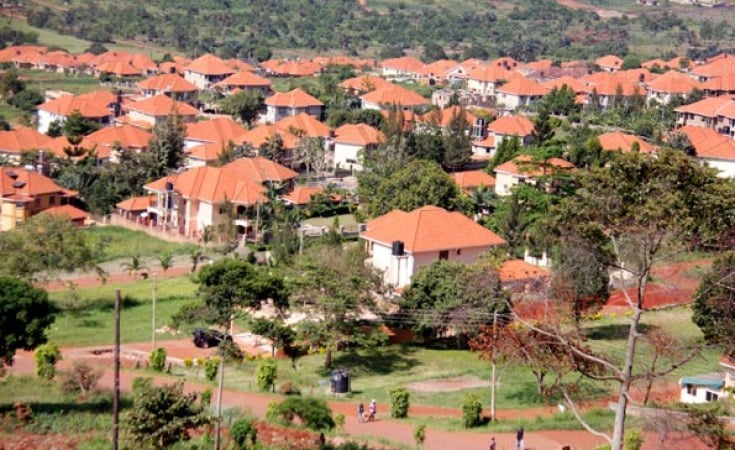Prime
Who should be involved in your land transaction?

Some people prefer buying land in estate because it is usually less contentious. PHOTO/file
What you need to know:
Land transactions are always associated, with misgivings which calls for due diligence while undertaking one. Some parties are important while others do not matter.
Japheth Oloit is Shs1m short of acquiring a plot of land in Kasanje, Wakiso District. Although the owner of the plot wants Shs17m for it, the area Local Council 1 chairperson who is involved in the transaction is demanding Shs1m for being a witness in the transaction agreement.
Oloit says that even though the LC1 chairperson has no share on the property, he threatens that the transaction would be void if he does not append his signature to the transaction. Oloit adds that the LC 1 official insists that the buyer has to pay more Shs120, 000 for the LC 1 stamp for the transaction to take place. This is an experience that most people face when trying to buy land. For a while, there have been unjustified fees levied by LC 1 authorities on land transactions and in July 2018 following the election of local council leadership, government warned them against administering charges on land sales.
Nicholas Mbabazi, a lawyer, explains that the LC I authorities’ involvement in land transactions is important but they have no legal obligation in issuing or signing land documents. He says that an LC 1 chairperson can be invited to give guidance on the history on the land and identifying boundaries.
“The role of LC 1 is like that of the neighbour of the land that is being sold. Their purpose is to confirm the boundaries and sometimes they act as whistleblowers in case of red flags,” he explains.
Who should be involved?
Mbabazi reveals that the persons involved in a land transaction are determined by the land tenure system it falls under. He further stresses, that in some aspects land transactions must involve families. Especially when land appears to be a matrimonial property and also land that is managed by family administrators.
He warns that a land transaction can always be considered fraudulent if important parties who are legally part of ownership, are not involved during the transaction.
Likewise, Gilbert Bukiiya, a lawyer explains that people involved in a land transaction, must be the legal owners, their lawyers and whoever is invited to witness the transaction, he however, notes that even without a signature or consent from the LC 1 chairperson the land transaction remains valid.
However, real estate dealer John Senyonjo, reveals that LC 1 chairpersons are crucial in land transactions, since they are key figures in tracing the history of land documents and opening boundaries.
“Most land transactions, previously involved LC leadership, that is why it is good to involve them during any transaction,” explains Senyonjo.
He, however, warns that in addition to local authorities, elders and long term permanent residents must be involved to avoid fraud. He reveals that some local leaders usually connive with brokers to dupe land buyers.
Family land
Milly Nassolo Kikomeko, a lawyer and women rights activist, explains that the Constitution and the Land Act give both women and men equal rights to own land and property, either as individuals or jointly with other persons. She also explains that ownership rights are never lost when people get married.
“Section 38 of the Land Act states that every spouse shall enjoy security of occupancy on family land, which means a right to have access to it and live on it,” Nassolo explains.
She adds that it is within the same section where a spouse is given powers to get involved in a transaction of family land. She notes that a spouse in every case, has a right to give or withhold his or her consent to any transaction.
Nassolo advises that in cases of legally married couples, for any transaction to be presumed valid, both parties must consent.
Similarly, Mbabazi adds that legally, a spouse is not allowed to sell, exchange or transfer, pledge, mortgage, give away or enter into any other transaction in respect of family land except with prior consent of the other spouse and, in some instances, the children.
Still on family land, Mbabazi explains that in cases when land is hereditary, all legal beneficiaries to the deceased owner have to consent for the transaction to take place.
He adds that in such cases, administrators of the deceased person’s estate have to assume powers of attorney to act on behalf of a registered owner.
Buganda and customary land
In Buganda region, there is land under the control of Buganda Land Board, an entity authorised by Buganda Kingdom to manage all the land under the jurisdiction of the kingdom.
Kingdom official and lawyer Daudi Mpanga reveals that the official position of occupancy on the kingdom land rules out mailo or freehold titling.
This implies that the official document provided to anyone acquiring land under Buganda Land Board is subjected to the system of leasehold and Kibanja (customary certificate of occupancy) with some conditions to be considered.
He adds that for anyone to transact land in Buganda, one has to do a background check and in case the land has any attachment with the kingdom, then transactions have to involve Buganda Land Board, thus an authorised official from the board must be involved in the transaction.
It should be noted that much as in the current dispensation, all land managed by Buganda Kingdom is barely called Kabaka’s land, not all land in Buganda is managed by Buganda Land Board.
A report by rights organisation Trocaire indicates that for a transaction to happen in cases of customary land tenure the applicant convenes a meeting with the family, clan or community to express his or her interest and all parties that have interest must agree.
Legal procedure
Nassolo reveals that there is a known process of acquiring land legally in Uganda and it is defined by known legal steps that can always guide the transaction.
She notes that for the transaction to take place, the buyer is always advised to visit the property, carry out a search at the Ministry of Lands, negotiation with the seller, hire a surveyor to verify the land size, make a sale agreements with both parties and their lawyers, make the transfer of rights, carry out property valuation, payment of stamp duty and acquire the land title.
She notes that parties must involve a surveyor to ascertain the size of the property and confirm its true description. She adds that the intending purchaser must conduct a boundary opening to confirm whether the boundaries are in consistent with the particulars of the land.
Above all, she adds that both parties must involve their lawyers to help confirm the authenticity of the title and other documents.
“A lawyer will provide knowledge on the legal way to carry out the transaction and drafting a sales agreement,” she adds.
Who can acquire land in Uganda?
The 1995 Constitution grants land ownership rights solely to citizens of Uganda. Foreigners cannot own land by freehold. They may, however, obtain leases for 49 or 99 years. Foreign investors, individual or corporate, cannot acquire land for the purpose of crop or animal production.
Procedures for the transaction
● Site visit to the land
● Appoint a lawyer to help you through the process.
● Land title search in the land registry office
● Meet the owner and negotiate prices.
● Use a professional surveyor to verify the land size
● Preparation of the sale agreement
● Payment of land rates
● Transfer documents and consent to transfer (land title transfer forms in Uganda)
● Property valuation
● Stamp duty payment
● Registration of transfer
● Final payment and exchange of completion documents
THE PROCESS OF BUYING LAND IN UGANDA
Buying land in Uganda is a tricky process. But doing your due diligence will protect you from conmen and fraudsters. Before you issue that cheque here are a few things you should do.
Pay a physical visit
Apart from making sure that the land actually exists, a physical visit will enable you assess the economic, and social infrastructure of the area. Talk to the local authorities and neighbours to ascertain ownership and availability.
Confirm with the ministry
Your lawyer should verify the authenticity of the title of ownership in the land office. You will need a photocopy of the land title deed from the seller to carry on the search properly. The Lands office will offer a search report, which must show the names of the owner in question plus other details as indicated on the title.
Negotiation with the seller
After ascertaining the proper ownership and provenance of the land in question, the buyer and his client can then meet the seller and negotiate on how much to pay for the land.
Survey the land
Get a professional registered surveyor to carry out a topographic survey of the land and confirm to you the size and shape as indicated on the title. The surveyor will also identify the land boundaries and mark stones. And then issue to you a survey report in respect of the land.
Sale agreement
This sale agreement will be drafted by the buyer with all terms and conditions agreed on by both parties. This will stipulate all the demarcations, sums, payment schedules, and implications.
Payment of land rates
Payment of rates on land is a legitimate requirement of landowners and the seller should clear any pending rates on the property before completing the transaction. And a seller should present a clearance certificate for the land before it is transferred to the buyer.
Transfer documents
These documents will only be accessed following an issued consent to transfer by the commissioner of lands. Also, you should apply for a government valuer, to make a site visit to enable them prepare the requisite valuation report all for purposes of stamp duty. This duty is vital since it acts as a registration fee for the property. The duty is determined by a professional government valuer and the valuation is to determine the true open market value as at the date of transfer.




